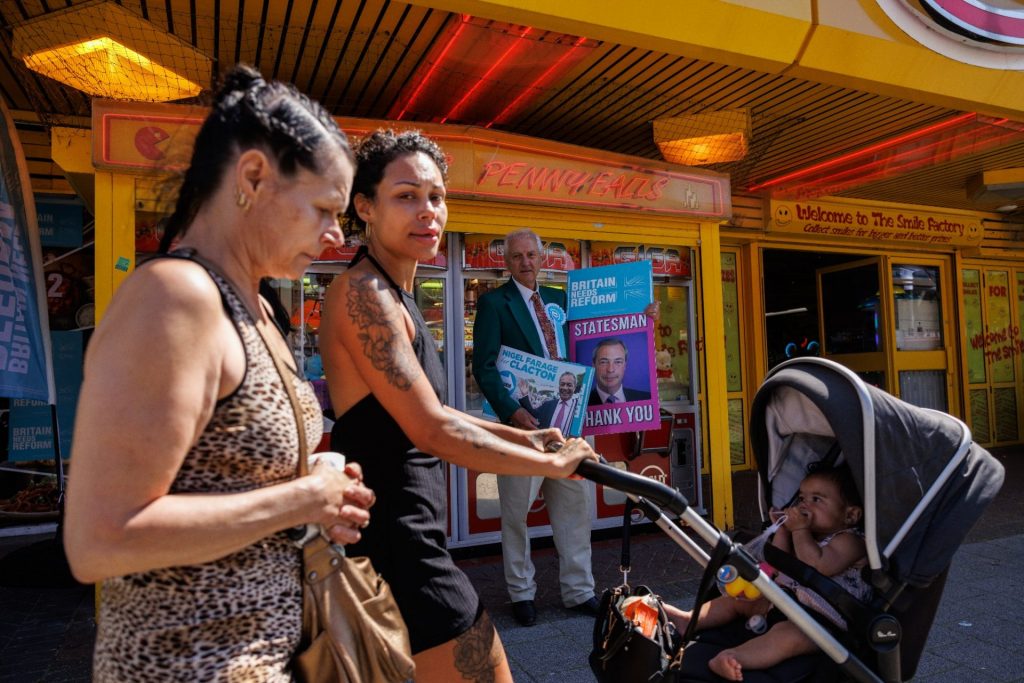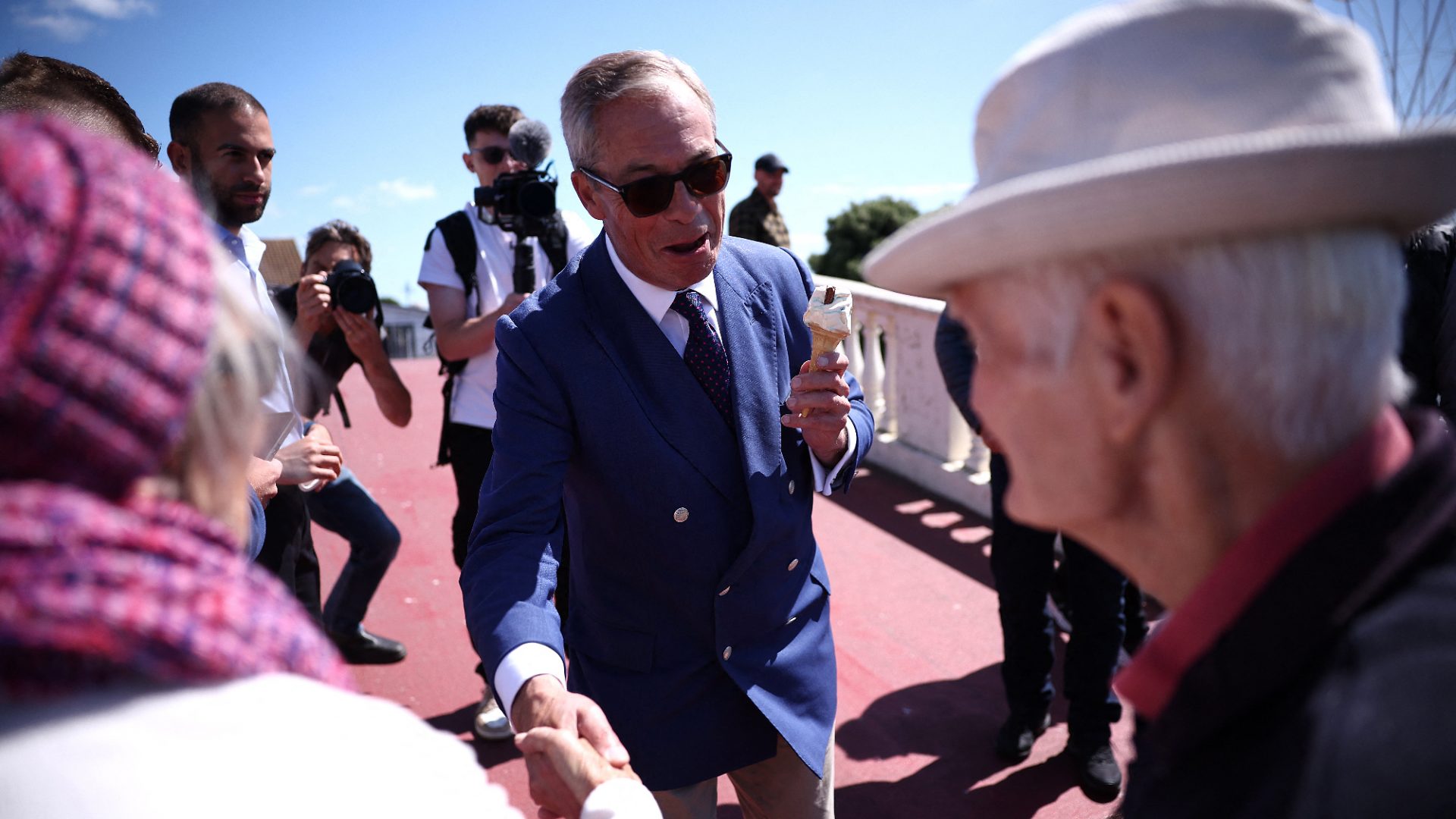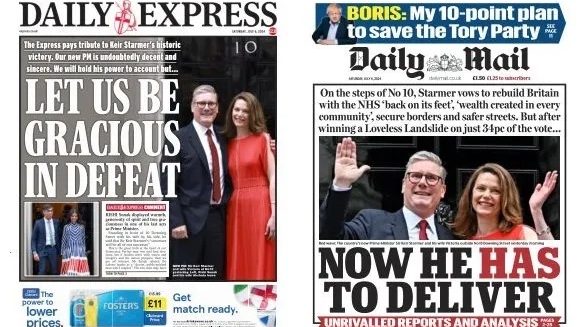After seven failed attempts to win a Westminster seat, Nigel Farage is now an MP and delighted that victory in Clacton gives him a platform right in the midst of Britain’s political discourse.
Yet representing a run-down constituency could also backfire for Farage and his new constituents. His campaign was one based almost entirely on fear – of immigrants, of change and of the modern world. It remains to be seen whether he can achieve anything positive for Clacton, or whether he is using it simply to advance his own ambitions.
And how will those ambitions be served by the minutae of being an MP? The surgeries, the demands for potholes to be fixed? They are a world away from gold lifts and private jets with Donald Trump.
Farage certainly brought a touch of Trumpian stardust to Clacton. Even Chris Griffiths, a local Tory councillor, admitted, “he’s one of the most exciting politicians of our generation” and “lit up what was probably going to be a very drab campaign”.
When I visited the town shortly before election day, the queues stretched down the street outside the Princes Theatre – and they hadn’t turned up to see The D-Day Darlings (“The UK’s premier wartime act”) or 80s Live (“The Ultimate Retro Concert”) or Thanks for the Memories (“Celebrating Happy Musical Memories from the 40s, 50s, 60s and 70s”), though all those attractions are coming soon. They had come to see Farage, another act promising to return this dilapidated working-class resort to its former glory.
They packed into the 820-seat auditorium even though the doyen of division was charging £3.41 a head for the privilege of hearing him (most parliamentary candidates humbly knock on doors).
“If you want pantomime, I hear Clacton’s nice this time of year,” Sir Keir Starmer had recently observed, and Farage did not disappoint. The great showman (some would say conman) entered the auditorium from the back, flanked by bodyguards. He made his way forward as the Eminem lyrics “Guess who’s back, back again?” blasted from giant speakers.
There, flanked by two large Union flags, he held his hands aloft, soaking up the roars of approval as pyrotechnics erupted on each side of the stage.
“Good evening, Clacton!” he cried before launching into his usual 40-minute schtick. Brexit – his Brexit – has been “betrayed” by the Conservatives, he protested. “Britain is broken,” he complained. Mass immigration amounts to a “national security crisis,” he said before adding, tongue in cheek: “The good news is only 800 young men crossed the English Channel today.”
The quips came thick and fast. “I’m told ‘Nigel, you’re wrecking the Conservative Party’s chances’. Well, they don’t need any help from me. They’re doing it themselves.”
So did the applause lines. The faithful jeered as he berated the BBC, Ulez and identity politics. They cheered as he demanded that Britain quit the European Convention on Human Rights, that the police should use their stop and search powers, and that schools must cease “poisoning the minds of our kids”. Trump-like, he mocked “Slippery Sunak” and “Call Me Dave” Cameron.
Then came the peroration. He was a “fighter” and a “warrior”, he said. He was afraid of nothing and nobody. He would be the “champion of the little men and little women”, the leader of the “people’s army”, the “voice of the silent majority” in parliament and the country. “The establishment’s terrified. The Conservatives are terrified. Labour aren’t scared yet, but by the time I’ve finished with them, they will be,” he declared, to a thunderous standing ovation.
No banana milkshakes were propelled his way this time – only adulation. Public-school educated and wealthy, Farage had once again managed to pose as the champion of the marginalised and downtrodden. “I feel he’s given a voice to the people who’ve been ignored,” said Tracey Neil, a credit controller. “He says what most people think and other politicians haven’t the guts to say,” said Karl Sergeant, a retired builder. “He talks the truth and says it like it is,” said Phil Murrell, a retired London Underground worker.
Peter Carlane, an electrician who is a member of Clacton’s Conservative Association and rents the flat above its Station Road office, told me he might switch from the Tories to Reform UK. “I’m a fan of Nigel’s and his plain talking,” said.
Farage had one last surprise before he started autographing placards and posing for selfies. He summoned to the stage and embraced four Tory councillors who had chosen that moment to defect to Reform.
Clacton was a perfect target for Farage. Neglected, run down and stuck at the far end of a very slow railway line from London, it seethes with a sense of grievance and victimhood that this ultimate purveyor of snake oil exploits with consummate skill.
Once a thriving resort for London’s workers, it was clobbered by the advent of budget airlines and cheap package holidays to Europe (Butlin’s closed its camp there in 1983). Behind the seafront, once-fine homes have been converted into flats, many of them now in poor condition, or boarded up. The shops are dingy. Much of Clacton’s population are pensioners in poor health, people on benefits or lacking qualifications.

On the town’s westernmost fringe is Jaywick, a jumble of 1930s holiday chalets that were built on salt marshes and which morphed into permanent homes after the second world war. It is now, officially, the most deprived community in England. You can buy a home there for £50,000.
Matthew Goodwin, the University of Kent professor who has charted the rise of Britain’s right wing populism, calls Clacton the “Ground Zero of Britain’s populist revolt”. It is, he says, “filled with the kind of voters who have consistently been most likely to vote Reform and back Farage in the past: working class, non-graduate, older, white, very concerned about the small boats that are bringing illegal immigrants into counties like Essex and Kent, and very keen to see legal migration reduced.”
Matthew Parris, the Times columnist, got into trouble a few years back for describing Clacton rather less charitably. He called it “a town called Hopeless… This is Britain on crutches. This is tracksuit and trainers Britain, tattoo-parlour Britain, all-our-yesterdays Britain”.
Not surprisingly, perhaps, Clacton fell for the chimera of Brexit. Indeed it was the inspiration for Brexit.
Back in 2014 its fervently Eurosceptic Conservative MP, Douglas Carswell, defected to the UK Independence Party, Reform’s predecessor, also led by Farage, and immediately won a by-election with a huge majority to become Ukip’s one and only MP.
He won again in the 2015 general election. Desperate to protect the Conservatives’ right flank from Ukip’s growing appeal, David Cameron called a referendum on leaving the EU the following year. Clacton voted 73% for Brexit – the highest Leave vote anywhere except for Boston and Skegness, another run-down, end-of-the-line seaside town, in Lincolnshire.
East Jaywick is considered one of the most deprived places in England. Photo: Oli Scarff/Getty
As Farage told the throng at the Princes Theatre: “Clacton has a very special place in my heart.”
That the hard Brexit he demanded and got has actually made Clacton poorer, and that immigration has soared since Britain left the EU, appears to matter little to most of its residents. They blame the Conservatives for that, not Farage.
“I don’t blame him. He’s not been in charge,” said a woman called Katy who runs a sweet shop in Jaywick. “The elite’s stopped it,” said Phil, the retired London Underground worker. Even Griffiths, the Conservative councillor, admitted: “A lot of us bought into the Brexit project and feel very, very betrayed by people in Westminster.”
Nor does it matter that Farage offers simplistic, unworkable, populist solutions to complex political problems. Or that he advocates swingeing cuts to the public services on which Clacton depends, in order to pay for tax giveaways. Or that he actively supports Donald Trump and admires Russia’s president, Vladimir Putin. Or that he ruled out standing for parliament earlier this year, sarcastically asking “Do I want to spend every Friday for the next five years in Clacton?”
Farage has also segued seamlessly from blaming the EU to blaming mass immigration for all of Britain’s woes – from housing shortages to rising rents, the scarcity of doctors and the difficulty in getting a dental appointment.
That plays especially well in an overwhelmingly white constituency that is eager to find a scapegoat for its struggles, and to which many residents came as part of the “white flight” from increasingly multicultural East London.
In coded language the issue came up time and again during my day in Clacton. “The country is full up,” said Linda Demirkol as she stood outside her tiny home in Jaywick. “People just want to see change in a direction that benefits English and British people,” said Mark Adams, a seaman. “Farage says things you’re frightened to say in case it’s portrayed as an ‘-ism’,” Jeanne Bennett, a civil servant, told me. Yes, she meant “racism”, she admitted when pressed.
Sometimes the language was not so coded. “If someone gave me a machine gun I’d sit on the beaches and shoot the boats,” declared Gary Swann, an unemployed window cleaner, as he queued outside the theatre.
The Labour candidate, Jovan Owusu-Nepaul, was 27, just two years out of Cambridge and the Birmingham-born son of a Jamaican father. He said he did not believe that Clacton was racist, and insisted that most people were friendly, but he had also been told “go home”, “we don’t want you here” and “immigrants out”. He believed Farage’s “dog whistle stuff” had inflamed tensions, and for him the election was about “what sort of country do we want to live in?”
I felt almost sorry for Giles Watling, the Tory incumbent. With his huge majority in 2019, and despite the unpopularity of his party nationally, he must have been reasonably confident of re-election until Farage suddenly and unexpectedly declared his candidacy on June 3, shunting aside Reform’s existing candidate in Clacton. Tony Mack, a former drug user who recovered to become a psychotherapist, told me with evident bitterness that he was informed of his demotion just 15 minutes before Farage’s announcement.
Watling was by all accounts a diligent, moderate MP who – unlike Farage – lived in the constituency. He had served as a local councillor, voted Remain in 2016 and helped secure £20m in levelling-up funds for Clacton. Tory luminaries like James Cleverly and Kemi Badenoch came from London to campaign for him.
He repeatedly warned that Farage “doesn’t give two hoots about Clacton. This is all about Nigel, as ever… I don’t want to see the residents of Clacton taken for granted and sacrificed on the altar of his vanity”.
Griffiths, the Tory councillor, echoed that fear, asking “what can he actually deliver?” as one of just five Reform UK MPs, and “are we going to be just somewhere he visits?”
They have a point. As a backbencher, Farage will have little real power beyond making himself, in his own words, “a bloody nuisance”. For all his promises, there will not be a lot he can do for Clacton.
But Clacton has done a lot for him. His electoral success there (and that of Richard Tice and Rupert Lowe in the equally deprived coastal constituencies of Boston and Skegness and Great Yarmouth) will surely register with Suella Braverman and other radical rightwingers in the rump of the defeated Conservative Party. In the looming leadership contest, they will doubtless cite it as evidence that their party needs to move even further to the populist, nativist, intolerant right, perhaps even merging with Reform.
That would be a serious mistake. Marooned on the east coast, its best days behind it and wallowing in the nostalgia of the “D-Day Darlings”, Clacton was tailor-made for Faragist exploitation. But it is scarcely typical of modern Britain, and scarcely the sort of mainstream, Home Counties constituency that the Conservatives will have to win back if they are ever to regain power.



